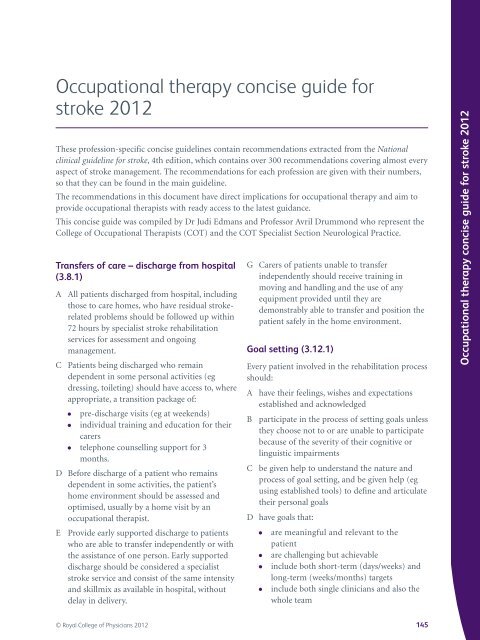national-clinical-guidelines-for-stroke-fourth-edition
national-clinical-guidelines-for-stroke-fourth-edition
national-clinical-guidelines-for-stroke-fourth-edition
You also want an ePaper? Increase the reach of your titles
YUMPU automatically turns print PDFs into web optimized ePapers that Google loves.
Occupational therapy concise guide <strong>for</strong><br />
<strong>stroke</strong> 2012<br />
These profession-specific concise <strong>guidelines</strong> contain recommendations extracted from the National<br />
<strong>clinical</strong> guideline <strong>for</strong> <strong>stroke</strong>, 4th <strong>edition</strong>, which contains over 300 recommendations covering almost every<br />
aspect of <strong>stroke</strong> management. The recommendations <strong>for</strong> each profession are given with their numbers,<br />
so that they can be found in the main guideline.<br />
The recommendations in this document have direct implications <strong>for</strong> occupational therapy and aim to<br />
provide occupational therapists with ready access to the latest guidance.<br />
This concise guide was compiled by Dr Judi Edmans and Professor Avril Drummond who represent the<br />
College of Occupational Therapists (COT) and the COT Specialist Section Neurological Practice.<br />
Transfers of care – discharge from hospital<br />
(3.8.1)<br />
A All patients discharged from hospital, including<br />
those to care homes, who have residual <strong>stroke</strong>related<br />
problems should be followed up within<br />
72 hours by specialist <strong>stroke</strong> rehabilitation<br />
services <strong>for</strong> assessment and ongoing<br />
management.<br />
C Patients being discharged who remain<br />
dependent in some personal activities (eg<br />
dressing, toileting) should have access to, where<br />
appropriate, a transition package of:<br />
● pre-discharge visits (eg at weekends)<br />
● individual training and education <strong>for</strong> their<br />
carers<br />
● telephone counselling support <strong>for</strong> 3<br />
months.<br />
D Be<strong>for</strong>e discharge of a patient who remains<br />
dependent in some activities, the patient’s<br />
home environment should be assessed and<br />
optimised, usually by a home visit by an<br />
occupational therapist.<br />
E Provide early supported discharge to patients<br />
who are able to transfer independently or with<br />
the assistance of one person. Early supported<br />
discharge should be considered a specialist<br />
<strong>stroke</strong> service and consist of the same intensity<br />
and skillmix as available in hospital, without<br />
delay in delivery.<br />
G Carers of patients unable to transfer<br />
independently should receive training in<br />
moving and handling and the use of any<br />
equipment provided until they are<br />
demonstrably able to transfer and position the<br />
patient safely in the home environment.<br />
Goal setting (3.12.1)<br />
Every patient involved in the rehabilitation process<br />
should:<br />
A have their feelings, wishes and expectations<br />
established and acknowledged<br />
B participate in the process of setting goals unless<br />
they choose not to or are unable to participate<br />
because of the severity of their cognitive or<br />
linguistic impairments<br />
C be given help to understand the nature and<br />
process of goal setting, and be given help (eg<br />
using established tools) to define and articulate<br />
their personal goals<br />
D have goals that:<br />
● are meaningful and relevant to the<br />
patient<br />
● are challenging but achievable<br />
● include both short-term (days/weeks) and<br />
long-term (weeks/months) targets<br />
● include both single clinicians and also the<br />
whole team<br />
© Royal College of Physicians 2012 145<br />
Occupational therapy concise guide <strong>for</strong> <strong>stroke</strong> 2012


